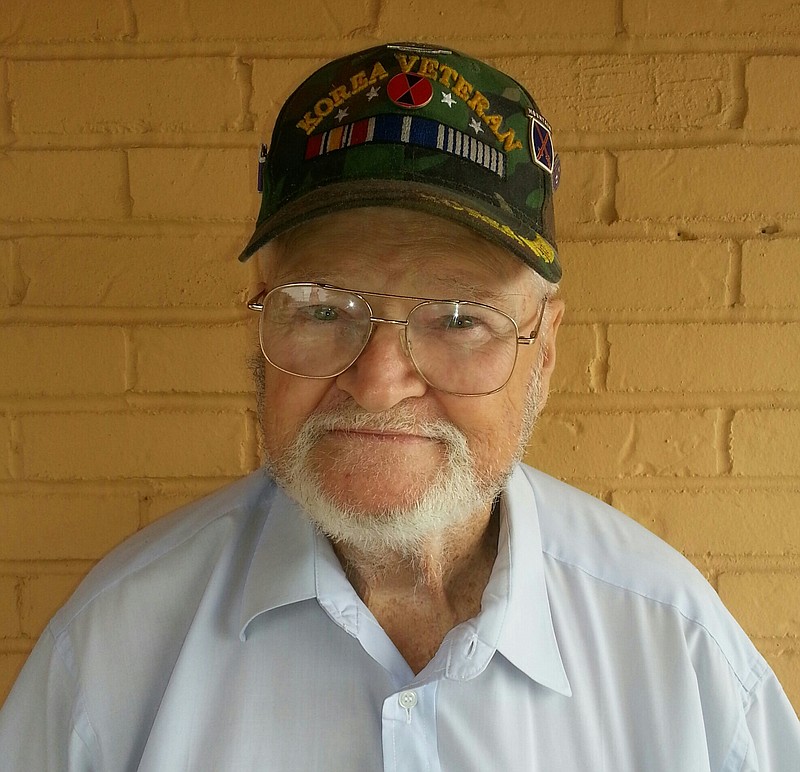As a young man just recently out of high school, local resident Bill Stroud received a lifetime of lessons during combat that few his age could fully appreciate. While only 18 years old, he received a blunt introduction to the hidden costs of war when wounded twice in combat.
Raised in the Marshall area, Stroud graduated from high school in 1950 and recalls enlisting in the Army just weeks later with a specific employment goal in mind.
"I wanted to become an FBI agent," recalls the 80-year-old veteran. "I thought I would do three years in the Army and be able to get a job."
But as Stroud jokingly notes, he failed to consider that he would need a college degree to pursue his career aspirations.
Less than a month following his enlistment, the Korean War broke out and the young recruit was soon on his way to Fort Riley, Kan., where he completed 16 weeks of initial training.
The following October, he traveled to Fort Bliss, Texas, to report for guided missile school.
"When I checked in they began
issuing me slide rules and math books," Stroud said. "I told them that I wasn't in the mood for any more schooling."
The soldier was informed that the only way he could be removed from the training would be to volunteer for service in Korea.
"I liked the idea of going to war," he said. "I was young and thought I was brave, but I learned that you don't realize what bravery really is until you have to go up against someone who is trying to kill you," he admonished.
Shipping out on a troop ship from Washington, Stroud arrived in Korea in November 1950 and was eventually assigned to the 7th Division located in Teague.
As Stroud explained, he was placed with the battalion's pioneer and ammunition platoon, which, in his words, included duties translated to mean "slave."
"We pulled all of the guard and heavy duty," he said. "After three months I went to the commander and requested a transfer to a line company."
He was then sent to K Company, 31st Regiment as a rifleman and spent much of his time on patrol in the mountains of central Korea. An incident unfolding on April 22, 1951, however, would provide his first lesson on the severity of service in a combat environment.
After encountering enemy troops while moving up a ridgeline, Stroud and a group of soldiers returned to their company headquarters to report the movement. They were then ordered to engage the enemy during which time a grenade was lobbed at Stroud.
"I hit the dirt and the grenade went off next to me," he said.
Wounded in the back, he was evacuated to a medical unit, which then sent him to a Danish hospital ship and eventually on to a military hospital in Japan where he recovered. He soon returned to his unit with three pieces of shrapnel still in his back, and earning the young man his first Purple Heart.
During a second incident the following November, Stroud was part of an assault during which the team he was with was engaged in attacking enemy bunkers. Cresting a ridge, an enemy machine gun "opened up" on the group and a ricocheted bullet struck Stroud under the left shoulder.
"I was wounded at 10:30 a.m. and they didn't get me on the helicopter until 8:30 that evening," he recalled.
Due to the seriousness of the injury, Stroud was flown to the states to receive treatment at Camp Chafee, Ark. He recovered from his injuries (receiving his second Purple Heart) and was later transferred to Fort Worden, Wash., remaining there to finish out his enlistment in June 1953.
After leaving the service, he stayed in Washington to work for Boeing for the next several years, and 1957, moved back to Missouri with his wife Frances - whom he married while serving in Washington - to establish residency in order to attend college.
Although he did not finish his degree, Stroud worked various jobs and later became a full-time police officer with the VA hospital in Columbia in 1972, from where he retired in 1989.
Maintaining a clear recollection of the events of his service during a war occurring more than 60 years past, Stroud believes the injuries he sustained in combat possess a relevancy for future leaders of the armed forces with regard to the costs associated with combat.
"Throughout the years," Stroud said, "(the government) has spent lots of money for medical expenses related to the injuries I received in combat."
With a momentary pause, he added, "I can only hope that my story can serve as an example to our leadership that once a country commits to combat, they should do so in such a manner that will end it quickly and not result in the unnecessary death and wounding of our nation's troops."
Jeremy P. Amick writes on behalf of the Silver Star Families of America.

